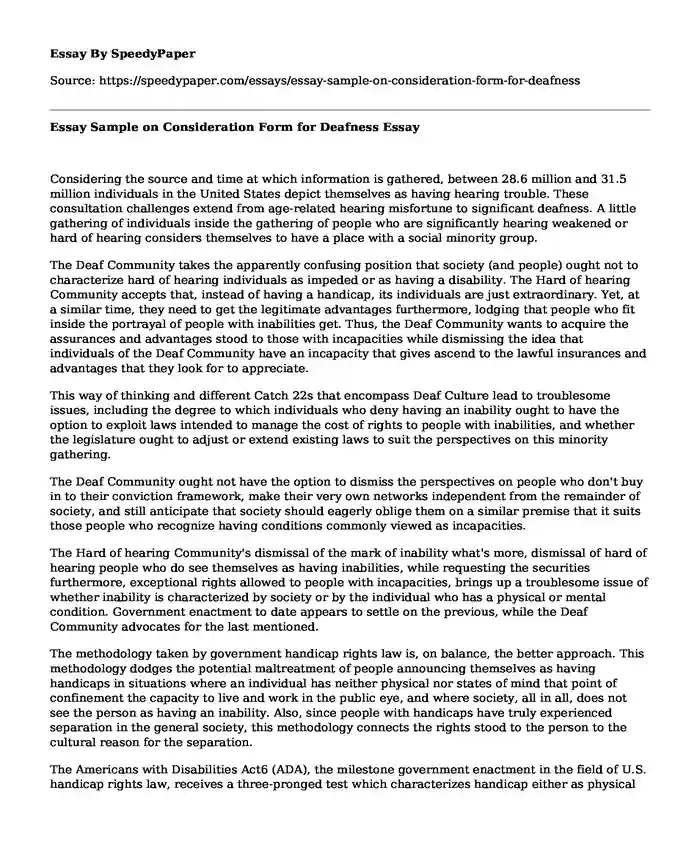
| Type of paper: | Course work |
| Categories: | Community Public health Community health |
| Pages: | 3 |
| Wordcount: | 771 words |
Considering the source and time at which information is gathered, between 28.6 million and 31.5 million individuals in the United States depict themselves as having hearing trouble. These consultation challenges extend from age-related hearing misfortune to significant deafness. A little gathering of individuals inside the gathering of people who are significantly hearing weakened or hard of hearing considers themselves to have a place with a social minority group.
The Deaf Community takes the apparently confusing position that society (and people) ought not to characterize hard of hearing individuals as impeded or as having a disability. The Hard of hearing Community accepts that, instead of having a handicap, its individuals are just extraordinary. Yet, at a similar time, they need to get the legitimate advantages furthermore, lodging that people who fit inside the portrayal of people with inabilities get. Thus, the Deaf Community wants to acquire the assurances and advantages stood to those with incapacities while dismissing the idea that individuals of the Deaf Community have an incapacity that gives ascend to the lawful insurances and advantages that they look for to appreciate.
This way of thinking and different Catch 22s that encompass Deaf Culture lead to troublesome issues, including the degree to which individuals who deny having an inability ought to have the option to exploit laws intended to manage the cost of rights to people with inabilities, and whether the legislature ought to adjust or extend existing laws to suit the perspectives on this minority gathering.
The Deaf Community ought not have the option to dismiss the perspectives on people who don't buy in to their conviction framework, make their very own networks independent from the remainder of society, and still anticipate that society should eagerly oblige them on a similar premise that it suits those people who recognize having conditions commonly viewed as incapacities.
The Hard of hearing Community's dismissal of the mark of inability what's more, dismissal of hard of hearing people who do see themselves as having inabilities, while requesting the securities furthermore, exceptional rights allowed to people with incapacities, brings up a troublesome issue of whether inability is characterized by society or by the individual who has a physical or mental condition. Government enactment to date appears to settle on the previous, while the Deaf Community advocates for the last mentioned.
The methodology taken by government handicap rights law is, on balance, the better approach. This methodology dodges the potential maltreatment of people announcing themselves as having handicaps in situations where an individual has neither physical nor states of mind that point of confinement the capacity to live and work in the public eye, and where society, all in all, does not see the person as having an inability. Also, since people with handicaps have truly experienced separation in the general society, this methodology connects the rights stood to the person to the cultural reason for the separation.
The Americans with Disabilities Act6 (ADA), the milestone government enactment in the field of U.S. handicap rights law, receives a three-pronged test which characterizes handicap either as physical or mental conditions that meddle with a person's everyday life, a record of disability or physical or states of mind others see as an inability.
Like others with inabilities, people with hearing weaknesses end up off guard when endeavoring to live and work in a general public that does not consequently oblige their needs. This drawback starts during childbirth for the individuals who are brought into the world hard of hearing, or on the other hand who become hard of hearing not long after birth, since babies learn discourse to a great extent through aural input. Children who are brought into the world hard of hearing, or lose their hearing not long after birth, do not get this basic information. A significant part of the data individuals get comes however sound-related channels such as regular discussion, radio, TV and other amusement media, and cautioning sounds, for example, horns what is more, alarms. People with hearing impedances have restricted or no entrance to data that comes through these media without exceptional facilities.
To acquire sound-related data, either the hard of hearing must oblige themselves to the general public in which they live, or society must make lodging for them. However numerous people with hindered hearing regularly are generally physically unclear from those without incapacities, making their inability imperceptible.
Conclusion
In conclusion, the powerlessness to get data through sound makes a gathering of individuals who show up equivalent to others, yet who have extra needs in view of their distinction. This undetectable contrast makes a potential strain between physical appearance and genuine needs.
Cite this page
Essay Sample on Consideration Form for Deafness. (2023, Mar 07). Retrieved from https://speedypaper.net/essays/essay-sample-on-consideration-form-for-deafness
Request Removal
If you are the original author of this essay and no longer wish to have it published on the SpeedyPaper website, please click below to request its removal:
- History Essay Example on Chicago Race Riot of 1919
- Essay Sample about Organized Crimes in the United States
- Free Essay: Using Bee Colony for Solving Traveling Salesman Problems TSP
- Free Essay Example on Why People Take Pictures
- Essay Sample: Jani Case Study
- Free Essay. Enterprise Resource Planning Program
- Free Paper Sample on Epidemiological Study
Popular categories




